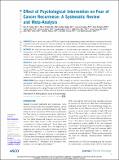Files in this item
Effect of psychological intervention on fear of cancer recurrence : a systematic review and meta-analysis
Item metadata
| dc.contributor.author | Tauber, Nina M. | |
| dc.contributor.author | O'Toole, Mia S. | |
| dc.contributor.author | Dinkel, Andreas | |
| dc.contributor.author | Galica, Jacqueline | |
| dc.contributor.author | Humphris, Gerry | |
| dc.contributor.author | Lebel, Sophie | |
| dc.contributor.author | Maheu, Christine | |
| dc.contributor.author | Ozakinci, Gozde | |
| dc.contributor.author | Prins, Judith | |
| dc.contributor.author | Sharpe, Louise | |
| dc.contributor.author | Smith, Allan 'Ben' | |
| dc.contributor.author | Thewes, Belinda | |
| dc.contributor.author | Simard, Sébastien | |
| dc.contributor.author | Zachariae, Robert | |
| dc.date.accessioned | 2019-09-19T08:30:06Z | |
| dc.date.available | 2019-09-19T08:30:06Z | |
| dc.date.issued | 2019-09-18 | |
| dc.identifier | 259451940 | |
| dc.identifier | 0d6e1271-505d-4c85-bc06-0801be9fd4aa | |
| dc.identifier | 85074304461 | |
| dc.identifier | 000501780200011 | |
| dc.identifier.citation | Tauber , N M , O'Toole , M S , Dinkel , A , Galica , J , Humphris , G , Lebel , S , Maheu , C , Ozakinci , G , Prins , J , Sharpe , L , Smith , A B , Thewes , B , Simard , S & Zachariae , R 2019 , ' Effect of psychological intervention on fear of cancer recurrence : a systematic review and meta-analysis ' , Journal of Clinical Oncology , vol. 37 . https://doi.org/10.1200/JCO.19.00572 | en |
| dc.identifier.issn | 0732-183X | |
| dc.identifier.uri | https://hdl.handle.net/10023/18507 | |
| dc.description | The study was supported in part by the Danish Cancer Society, Grant# R150-A10080 | en |
| dc.description.abstract | Purpose Fear of cancer recurrence (FCR) is a significantly distressing problem that affects a substantial number of patients with and survivors of cancer; however, the overall efficacy of available psychological interventions on FCR remains unknown. We therefore evaluated this in the present systematic review and meta-analysis. Methods We searched key electronic databases to identify trials that evaluated the effect of psychological interventions on FCR among patients with and survivors of cancer. Controlled trials were subjected to meta-analysis, and the moderating influence of study characteristics on the effect were examined. Overall quality of evidence was evaluated using the GRADE system. Open trials were narratively reviewed to explore ongoing developments in the field (PROSPERO registration no.: CRD42017076514). Results A total of 23 controlled trials (21 randomized controlled trials) and nine open trials were included. Small effects (Hedges’s g) were found both at postintervention (g = 0.33; 95% CI, 0.20 to 0.46; P < .001) and at follow-up (g = 0.28; 95% CI, 0.17 to 0.40; P < .001). Effects at postintervention of contemporary cognitive behavioral therapies (CBTs; g = 0.42) were larger than those of traditional CBTs (g = 0.24; β = .22; 95% CI, .04 to .41; P = .018). At follow-up, larger effects were associated with shorter time to follow-up (β = −.01; 95% CI, −.01 to −.00; P = .027) and group-based formats (β = .18; 95% CI, .01 to .36; P = .041). A GRADE evaluation indicated evidence of moderate strength for effects of psychological intervention for FCR. Conclusion Psychological interventions for FCR revealed a small but robust effect at postintervention, which was largely maintained at follow-up. Larger postintervention effects were found for contemporary CBTs that were focused on processes of cognition—for example, worry, rumination, and attentional bias—rather than the content, and aimed to change the way in which the individual relates to his or her inner experiences. Future trials could investigate how to further optimize and tailor interventions to individual patients’ FCR presentation. | |
| dc.format.extent | 18 | |
| dc.format.extent | 854490 | |
| dc.language.iso | eng | |
| dc.relation.ispartof | Journal of Clinical Oncology | en |
| dc.subject | BF Psychology | en |
| dc.subject | RC0254 Neoplasms. Tumors. Oncology (including Cancer) | en |
| dc.subject | SDG 3 - Good Health and Well-being | en |
| dc.subject.lcc | BF | en |
| dc.subject.lcc | RC0254 | en |
| dc.title | Effect of psychological intervention on fear of cancer recurrence : a systematic review and meta-analysis | en |
| dc.type | Journal item | en |
| dc.contributor.institution | University of St Andrews. Sir James Mackenzie Institute for Early Diagnosis | en |
| dc.contributor.institution | University of St Andrews. Population and Behavioural Science Division | en |
| dc.contributor.institution | University of St Andrews. WHO Collaborating Centre for International Child & Adolescent Health Policy | en |
| dc.contributor.institution | University of St Andrews. Health Psychology | en |
| dc.contributor.institution | University of St Andrews. St Andrews Sustainability Institute | en |
| dc.contributor.institution | University of St Andrews. School of Medicine | en |
| dc.identifier.doi | https://doi.org/10.1200/JCO.19.00572 | |
| dc.description.status | Peer reviewed | en |
This item appears in the following Collection(s)
Items in the St Andrews Research Repository are protected by copyright, with all rights reserved, unless otherwise indicated.

